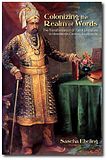Colonizing the Realm of Words
Ebeling, Sascha:
Colonizing the realm of words : the transformation of Tamil literature in nineteenth-century South India / Sascha Ebeling. - Albany : State University of New York Press, 2010. - ca. 336 S. - (Suny series in Hindu studies)
Hochschulschrift. Teilw. zugl.: Köln, Univ., Diss., 2005 unter dem Titel: The transformation of Tamil literature during the nineteenth century (siehe DNB)
ISBN 978-1-4384-3199-4
DDC 894.81109004
-- Angekündigt für August 2010 --
Beschreibung
A true tour de force, this book documents the transformation of one Indian literature, Tamil, under the impact of colonialism and Western modernity. While Tamil is a living language, it is also India’s second oldest classical language next to Sanskrit, and has a literary history that goes back over two thousand years. On the basis of extensive archival research, Sascha Ebeling tackles a host of issues pertinent to Tamil elite literary production and consumption during the nineteenth century. These include the functioning and decline of traditional systems in which poet-scholars were patronized by religious institutions, landowners, and local kings; the anatomy of changes in textual practices, genres, styles, poetics, themes, tastes, and audiences; and the role of literature in the politics of social reform, gender, and incipient nationalism. The work concludes with a discussion of the most striking literary development of the time—the emergence of the Tamil novel. [Verlagsinformation]
Inhalt
List of Figures and Tables
Preface and Acknowledgments
List of Abbreviations
Note on Transliteration, Pronunciation, and Translations of Tamil Primary Sources
CHAPTER 1
1. Introduction
2. Colonizing the Realm of Words: Literature and Colonialism
3. Tamil Literature in Nineteenth-Century South India
4. How to Ignore a Century of Literary Production
5. A Century of Cultural Change
6. In Search of a Lost Literature: The Chapters of This Book
CHAPTER 2
7. Mapping the Universe of the Pulavar: Ti. Mīnātcicuntaram Pillai (1815–1876) and the Field of Traditional Literary Practices
8. Pulavar Education and Pre-Modern Tamil Poetics
9. The Pulavars’ Genres: Pirapantam Works and Temple Myths (talapurānam)
10. Scholarship in the Name of the Lord: Monasteries as Patrons
11. When One’s Fame Rises to the Heavens: The Pulavars’ Economy of Praise
12. “Addressing the Assembly of Poets” (avaiyatakkam)
13. The Public Premiere (arankērram)
14. Occasional Poems (tanippātal) and Epistolary Poems (cīttukkavi)
15. The Spoken and the Written Word: Composition, Performance, and Transmission
16. Of Gods and Kings: Themes and Contents of Pulavar Literature
17. The Uses of Akam Poetics in the Nineteenth Century: The Kulattūrkkōvai (1853)
18. Makāvittuvān Ti. Mīnātcicuntaram Pillai: A Poets’ Poet
CHAPTER 3
19. Pulavars and Potentates: Structures of Literary Patronage at the Zamindars’ Courts and Beyond
20. Literature and Rituals of Courtly Representation
21. The System of Literary Patronage at the Zamindars’ Courts
22. A “Who Is Who” of Nineteenth-Century Royal Patrons and Their Poets
- Thanjavur
- Pudukkottai
- Ramnad and Sivagangai
- Smaller Zamindaris
23. Of Beauty and Benevolence: Themes of Courtly Literature
24. Kāmas's Arrows Whizzing Past the King: Royal Panegyrics and Eroticism in the Cētupati viralivitutūtu
25. The Pulavar in the Age of Mechanical Reproduction: Changes in Patronage
CHAPTER 4
26. Toward the Modern Tamil Author: The Colonial Critique of the “Vernacular” and Māyūram Vētanāyakam Pillai (1826–1889) as an Agent of Change
27. Māyūram Vētanāyakam Pillai: A Biographical Reconstruction
28. Writing for “the moral improvement of the Natives of India”: The Nītinūl (1859)
29. Law, Women’s Education and Devotional Poetry: Vētanāyakam Pillai's Other Writings
CHAPTER 5
30. The Emergence of the Tamil Novel
31. The History of Prathapa Mudaliar (1879): An “approximation to a novel”?
32. The History of Suguna Sundari (1887): A “longwinded moral tale, weary and unprofitable”?
33. The Fatal Rumor or The History of Kamalambal (1893–1895): “Vedanta through fiction”?
34. Further Comparisons
CHAPTER 6
Epilogue
APPENDICES
- The Dating of the Cētupati viralivitutūtu Revisited
- Chronological Table of the Earliest Tamil Novels Published Before 1900
- Original Tamil Texts Quoted and Annotations
Glossary
References
Index
Autor
SASCHA EBELING is Assistant Professor of South Asian Languages and Civilizations at the University of Chicago. Faculty profile.
Quellen: State University of New York Press; Library of Congress; WorldCat; Amazon

